The Eagle
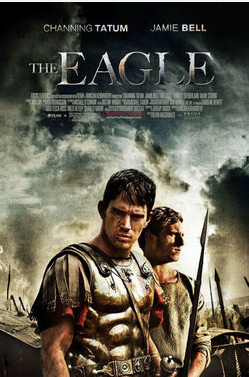
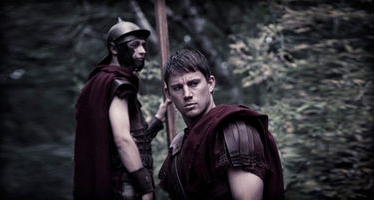 To be fair, Macdonald has the look right. He gets some great images, both on the battlefield, and of scenic views of old Britain. I also admired that he does not rely upon CG to tell his story, and instead seems to have funneled a lot of money into staging elaborate sequences that hold a large number of extras locked in battle. But even this loses a lot of its effect when you can't see it that clearly. The battles are shot too close to the action, and edited very rapidly. Most likely to avoid receiving an R-rating. We see a lot of bodies flying at the camera, and a lot of stabbing and thrusting, but the images barely register before we're off to the next image. He also uses soft focus a lot, making many of his scenes unnecessarily blurry at times. Why any filmmaker would choose to do this is anyone's guess. It adds nothing to the atmosphere, and robs us of the detail he's obviously striving for.
To be fair, Macdonald has the look right. He gets some great images, both on the battlefield, and of scenic views of old Britain. I also admired that he does not rely upon CG to tell his story, and instead seems to have funneled a lot of money into staging elaborate sequences that hold a large number of extras locked in battle. But even this loses a lot of its effect when you can't see it that clearly. The battles are shot too close to the action, and edited very rapidly. Most likely to avoid receiving an R-rating. We see a lot of bodies flying at the camera, and a lot of stabbing and thrusting, but the images barely register before we're off to the next image. He also uses soft focus a lot, making many of his scenes unnecessarily blurry at times. Why any filmmaker would choose to do this is anyone's guess. It adds nothing to the atmosphere, and robs us of the detail he's obviously striving for.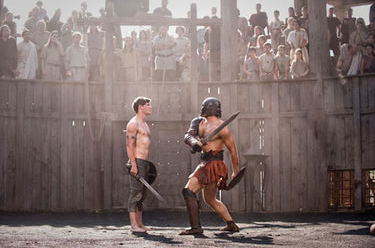 And yet, I would be able to forgive this if the story was able to grab me for one minute. It never did, because its hero, a Roman soldier named Marcus Flavius Aquila (played with all the passion of a tree stump by the lifeless Channing Tatum), is a dullard. The only thing that stands out about Marcus is his modern American accent, rare for a Roman soldier serving his country in 2nd Century Britain. But, at least he's in good company. Nobody's accent sounds right in this movie. Heck, some of his fellow Romans sound like they just stepped out of Brooklyn. The best thing that can be said about Tatum's performance as Marcus is that he's physically fit, and looks determined in battle. But, whenever he's asked to call upon any human emotion, he acts like the very concept alludes him. Marcus is supposed to be haunted by the memory of his father, a once great soldier who became disgraced when a group of soldiers he was leading mysteriously disappeared. The problem is, Tatum doesn't so much come across as haunted, rather he comes across confused.
And yet, I would be able to forgive this if the story was able to grab me for one minute. It never did, because its hero, a Roman soldier named Marcus Flavius Aquila (played with all the passion of a tree stump by the lifeless Channing Tatum), is a dullard. The only thing that stands out about Marcus is his modern American accent, rare for a Roman soldier serving his country in 2nd Century Britain. But, at least he's in good company. Nobody's accent sounds right in this movie. Heck, some of his fellow Romans sound like they just stepped out of Brooklyn. The best thing that can be said about Tatum's performance as Marcus is that he's physically fit, and looks determined in battle. But, whenever he's asked to call upon any human emotion, he acts like the very concept alludes him. Marcus is supposed to be haunted by the memory of his father, a once great soldier who became disgraced when a group of soldiers he was leading mysteriously disappeared. The problem is, Tatum doesn't so much come across as haunted, rather he comes across confused.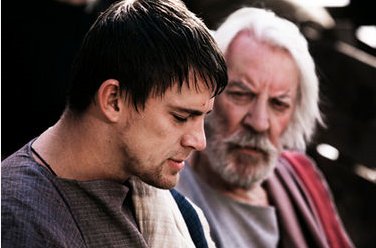 The day that his father's army disappeared, a golden eagle symbol (which his father was in care of) disappeared as well. This apparently brought much shame upon the Roman Empire, as the Eagle represents everything they stand for. (Just go with it, the movie doesn't bother to go into much detail.) So, naturally, Marcus wants to not only find out what happened to his father and his army, but also to the eagle, and return it to his superiors. But first, he's placed in charge of a military garrison, where he successfully defends it and the men under his command against a sneak attack by enemy forces. When Marcus is injured in battle, he's given an honorable discharge. His military service over, Marcus decides to pack up his things, bring along his faithful slave companion Esca (Jamie Bell), and go into the dangerous northern territory, where his father's army vanished, and go on a quest for the truth.
The day that his father's army disappeared, a golden eagle symbol (which his father was in care of) disappeared as well. This apparently brought much shame upon the Roman Empire, as the Eagle represents everything they stand for. (Just go with it, the movie doesn't bother to go into much detail.) So, naturally, Marcus wants to not only find out what happened to his father and his army, but also to the eagle, and return it to his superiors. But first, he's placed in charge of a military garrison, where he successfully defends it and the men under his command against a sneak attack by enemy forces. When Marcus is injured in battle, he's given an honorable discharge. His military service over, Marcus decides to pack up his things, bring along his faithful slave companion Esca (Jamie Bell), and go into the dangerous northern territory, where his father's army vanished, and go on a quest for the truth.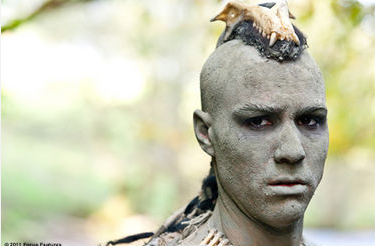 The quest probably would have come across as more dangerous if it wasn't so reliant on contrivance and convenience. Marcus and Esca stumble upon the answers they're looking for in a timely manner, making the narrative of The Eagle seem like an afterthought. It never feels like a cohesive flow, rather we feel like screenwriter Jeremy Brock is checking off the key moments documented in the original novel by Rosemary Sutcliff, which inspired the film. We don't feel close to the characters, and it's not entirely the fault of the actors. Unlike Tatum, Jamie Bell seems to be genuinely trying to wring some emotion out of his underwritten role, but he never quite succeeds. At least he goes down trying. Everybody else acts and talks so modern (even throwing some slang in the dialogue) that it's distracting. I understand that this was an artistic choice, but it just doesn't work.
The quest probably would have come across as more dangerous if it wasn't so reliant on contrivance and convenience. Marcus and Esca stumble upon the answers they're looking for in a timely manner, making the narrative of The Eagle seem like an afterthought. It never feels like a cohesive flow, rather we feel like screenwriter Jeremy Brock is checking off the key moments documented in the original novel by Rosemary Sutcliff, which inspired the film. We don't feel close to the characters, and it's not entirely the fault of the actors. Unlike Tatum, Jamie Bell seems to be genuinely trying to wring some emotion out of his underwritten role, but he never quite succeeds. At least he goes down trying. Everybody else acts and talks so modern (even throwing some slang in the dialogue) that it's distracting. I understand that this was an artistic choice, but it just doesn't work.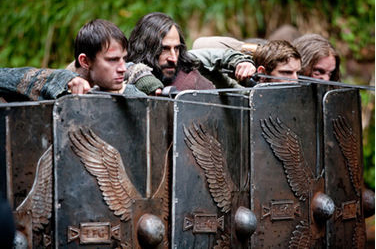
See the movie times in your area or buy the DVD at Amazon.com!






0 Comments:
Post a Comment
<< Home